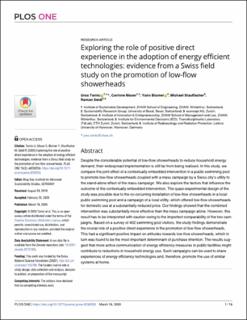Please use this identifier to cite or link to this item:
https://doi.org/10.21256/zhaw-19827Full metadata record
| DC Field | Value | Language |
|---|---|---|
| dc.contributor.author | Tomic, Uros | - |
| dc.contributor.author | Moser, Corinne | - |
| dc.contributor.author | Blumer, Yann | - |
| dc.contributor.author | Stauffacher, Michael | - |
| dc.contributor.author | Seidl, Roman | - |
| dc.date.accessioned | 2020-03-19T14:08:28Z | - |
| dc.date.available | 2020-03-19T14:08:28Z | - |
| dc.date.issued | 2020-03-16 | - |
| dc.identifier.issn | 1932-6203 | de_CH |
| dc.identifier.uri | https://digitalcollection.zhaw.ch/handle/11475/19827 | - |
| dc.description.abstract | Despite the considerable potential of low-flow showerheads to reduce household energy demand, their widespread implementation is still far from being realised. In this study, we compare the joint effect of a contextually embedded intervention in a public swimming pool to promote low-flow showerheads coupled with a mass campaign by a Swiss city’s utility to the stand-alone effect of the mass campaign. We also explore the factors that influence the outcome of the contextually embedded intervention. The quasi-experimental design of the study was possible due to the co-occurring installation of low-flow showerheads in a local public swimming pool and a campaign of a local utility, which offered low-flow showerheads for domestic use at a substantially reduced price. Our findings showed that the combined intervention was substantially more effective than the mass campaign alone. However, this result has to be interpreted with caution owing to the imperfect comparability of the two campaigns. Based on a survey of 402 swimming pool visitors, the study findings demonstrate the crucial role of a positive direct experience in the promotion of low-flow showerheads. This had a significant positive impact on attitudes towards low-flow showerheads, which in turn was found to be the most important determinant of purchase intention. The results suggest that more active communication of energy efficiency measures in public facilities might contribute to reductions in household energy use. Such campaigns can be used to share experiences of energy efficiency technologies and, therefore, promote the use of similar systems at home. | de_CH |
| dc.language.iso | en | de_CH |
| dc.publisher | Public Library of Science | de_CH |
| dc.relation.ispartof | PLOS ONE | de_CH |
| dc.rights | http://creativecommons.org/licenses/by/4.0/ | de_CH |
| dc.subject.ddc | 333.79: Energie | de_CH |
| dc.title | Exploring the role of positive direct experience in the adoption of energy efficient technologies : evidence from a Swiss field study on the promotion of low-flow showerheads | de_CH |
| dc.type | Beitrag in wissenschaftlicher Zeitschrift | de_CH |
| dcterms.type | Text | de_CH |
| zhaw.departement | School of Engineering | de_CH |
| zhaw.departement | School of Management and Law | de_CH |
| zhaw.organisationalunit | Institut für Nachhaltige Entwicklung (INE) | de_CH |
| zhaw.organisationalunit | Institut für Innovation und Entrepreneurship (IIE) | de_CH |
| dc.identifier.doi | 10.1371/journal.pone.0230255 | de_CH |
| dc.identifier.doi | 10.21256/zhaw-19827 | - |
| zhaw.funding.eu | No | de_CH |
| zhaw.issue | 3 | de_CH |
| zhaw.originated.zhaw | Yes | de_CH |
| zhaw.pages.start | e0230255 | de_CH |
| zhaw.publication.status | publishedVersion | de_CH |
| zhaw.volume | 15 | de_CH |
| zhaw.publication.review | Peer review (Publikation) | de_CH |
| zhaw.funding.snf | 153769 | de_CH |
| zhaw.webfeed | Nachhaltigkeitskommunikation | de_CH |
| zhaw.author.additional | Yes | de_CH |
| Appears in collections: | Publikationen School of Engineering | |
Files in This Item:
| File | Description | Size | Format | |
|---|---|---|---|---|
| 2020_Tomic-Moser-Blumer_Low-flow-showerheads_PLOS-ONE.pdf | 535.1 kB | Adobe PDF |  View/Open |
Show simple item record
Tomic, U., Moser, C., Blumer, Y., Stauffacher, M., & Seidl, R. (2020). Exploring the role of positive direct experience in the adoption of energy efficient technologies : evidence from a Swiss field study on the promotion of low-flow showerheads. Plos One, 15(3), e0230255. https://doi.org/10.1371/journal.pone.0230255
Tomic, U. et al. (2020) ‘Exploring the role of positive direct experience in the adoption of energy efficient technologies : evidence from a Swiss field study on the promotion of low-flow showerheads’, PLOS ONE, 15(3), p. e0230255. Available at: https://doi.org/10.1371/journal.pone.0230255.
U. Tomic, C. Moser, Y. Blumer, M. Stauffacher, and R. Seidl, “Exploring the role of positive direct experience in the adoption of energy efficient technologies : evidence from a Swiss field study on the promotion of low-flow showerheads,” PLOS ONE, vol. 15, no. 3, p. e0230255, Mar. 2020, doi: 10.1371/journal.pone.0230255.
TOMIC, Uros, Corinne MOSER, Yann BLUMER, Michael STAUFFACHER und Roman SEIDL, 2020. Exploring the role of positive direct experience in the adoption of energy efficient technologies : evidence from a Swiss field study on the promotion of low-flow showerheads. PLOS ONE. 16 März 2020. Bd. 15, Nr. 3, S. e0230255. DOI 10.1371/journal.pone.0230255
Tomic, Uros, Corinne Moser, Yann Blumer, Michael Stauffacher, and Roman Seidl. 2020. “Exploring the Role of Positive Direct Experience in the Adoption of Energy Efficient Technologies : Evidence from a Swiss Field Study on the Promotion of Low-Flow Showerheads.” Plos One 15 (3): e0230255. https://doi.org/10.1371/journal.pone.0230255.
Tomic, Uros, et al. “Exploring the Role of Positive Direct Experience in the Adoption of Energy Efficient Technologies : Evidence from a Swiss Field Study on the Promotion of Low-Flow Showerheads.” Plos One, vol. 15, no. 3, Mar. 2020, p. e0230255, https://doi.org/10.1371/journal.pone.0230255.
Items in DSpace are protected by copyright, with all rights reserved, unless otherwise indicated.